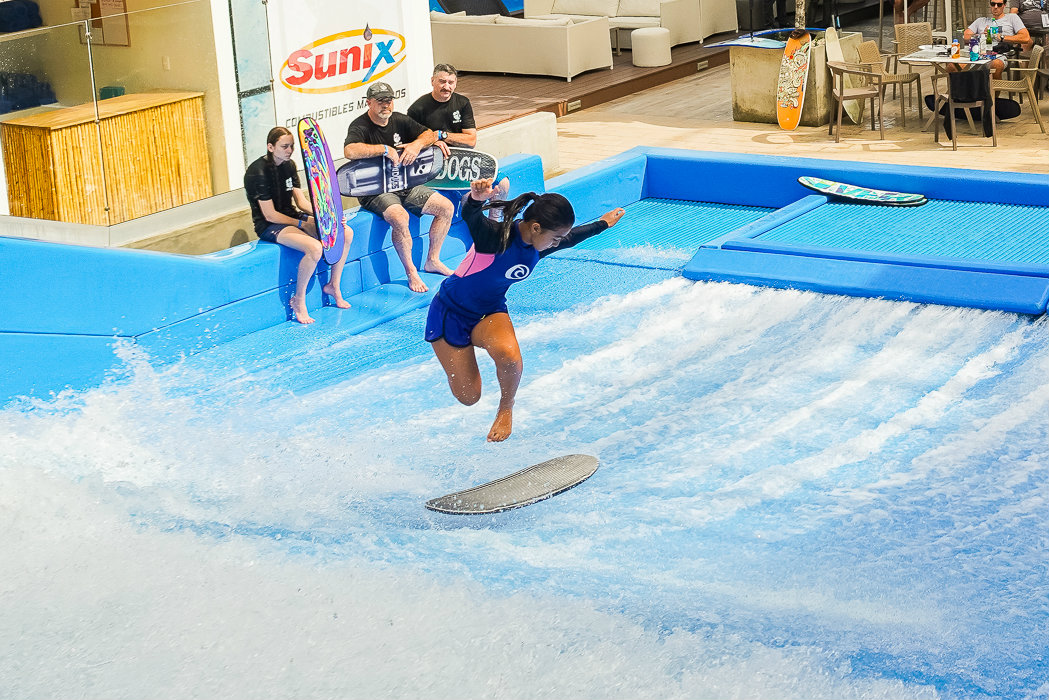After a two-year legal battle, a California court granted waterpark-attraction maker Whitewater West Industries the patent to certain inventions meant to be used on surf simulators such as those produced by Whitewater’s FlowRider business.
Whitewater West Industries has won a legal dispute regarding patents for certain technologies used on surf simulators similar to those produced by its FlowRider division.
The waterpark attractions maker sued competitor Pacific Surf Designs and its owners, Richard Alleshouse and Yong Yeh over three patents. The lawsuit involved two patents for technology used on a half-pipe/quarter-pipe sheet wave attraction, and the patent for a nozzle structure that allows adjustable, non-planar flow on sheet rides, similar to that used on FlowRider’s WaveOz attraction.
-
WhiteWater Patent Lawsuit Reversed
An Appeals Court reversed a decision in a patent lawsuit between WhiteWater and Pacific Surf Designs

Alleshouse worked for Wave Loch, the company that originated the FlowRider line, for the five years immediately before he started Pacific Surf Designs. According to court documents, he signed a non-disclose/non-compete covenant with Wave Loch. The contract’s language stipulated that Alleshouse would have to surrender any inventions, improvements and developments derived from his employment to Wave Loch, and that he could not use any confidential information gained from Wave Loch in a competing company. According to court documents, the non-disclose/non-compete went on to say that Alleshouse’s obligations outlined in the agreement would transfer to any company that purchased Wave Loch.
In 2012, Alleshouse left Wave Loch to begin his company with Yeh and, approximately three months later, applied for patents on the technologies in question. That same year, Whitewater acquired the FlowRider business from Wave Loch. A later agreement between Wave Loch and Whitewater specifically transferred Alleshouse’s non-compete obligations to FlowRider and, by extension, Whitewater.
The plaintiff claimed that Alleshouse would not have been able to develop the technologies in question were it not for his work in Wave Loch, specifically his participation in researching and developing the WaveOz and a half-pipe product that Wave Loch eventually decided against bringing to market.
Whitewater sued Alleshouse for breach of contract; Yeh and Pacific Surf Designs with intentional interference with a contract; and Pacific Surf Designs with a California Business and Professions Code violation. The plaintiff sought to have Yeh removed from the patents, saying he didn’t actually contribute to the invention, and to receive $1.8 million in damages.
The defendants argued that Alleshouse’s non-compete agreement only applied to the company he started with, Wave Loch Inc. When that firm reorganized into a limited liability company (LLC) in 2009, the defendants said, Alleshouse’s agreement was not transferred. Therefore, they said, Wave Loch LLC didn’t have to right to transfer the agreement to its FlowRider business and, eventually, to Whitewater.
They also said the agreement was not valid because it was too one-sided and oppressive, it did not define the company clearly enough, and the stipulation transferring Alleshouse’s obligation extended past California law restricting an employer’s ability to monopolize an employee’s ideas and inventions.
Therefore, they contended that Whitewater had no standing to sue.
The judge agreed with each party on certain questions. Regarding application of the non-compete agreement, the judge agreed with the plaintiff, stating, “… Whitewater is a successor of Wave Loch Inc. and properly holds the agreement.”
The judge also said that Alleshouse’s filing for his patents only three months after leaving Wave Loch showed that the inventions derived from his time at Wave Loch. Additionally, the judge stated, Alleshouse had been exposed to closely related technologies while working at Wave Loch. “Common sense shows that the inventions at issue resulted from Mr. Alleshouse’s work at Wave Loch,” the judge said in his written decision.
The judge ruled that Yeh must be taken off the patents, and that the patents be reassigned to Whitewater.
But while the judge agreed that Alleshouse breached the non-compete, he said Whitewater did not prove that Yeh and Pacific Surf Designs intentionally interfered with the agreement. Further, the judge decided against the charge that Pacific Surf Designs violated California Business and Professions Code. The judge turned down Whitewater’s request for monetary damages, saying that, since PSD never sold rides based on the patents, Whitewater did not take a loss.

